
The Internet's Premier Classical Music Source
Related Links
- Latest Reviews
- More Reviews
-
By Composer
-
Collections
DVD & Blu-ray
Books
Concert Reviews
Articles/Interviews
Software
Audio
Search Amazon
Recommended Links
Site News
 CD Review
CD Review
Evgeny Svetlanov Conducts
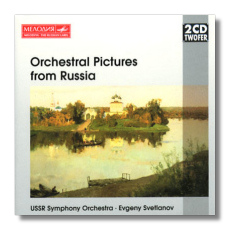
Orchestral Pictures from Russia
- Modest Mussorgsky:
- Dawn on the Moscow River (from Khovanshchina)
- A Night on Bald Mountain (Orch. Rimsky-Korsakov)
- Hopak (from Sorchintsy Fair)
- Alexander Borodin:
- In the Steppes of Central Asia
- Polovtsian Dances (from Prince Igor)
- Nicolai Rimsky-Korsakoff:
- Sadko, Op. 5
- Russian Easter Overture, Op. 36
- Mili Balakirev: Islamey (Orch. Lyapunov)
- Anton Arensky: Overture from Dream on the Volga
- Alexander Glazunov:
- Spring, Op. 34
- Romantic Intermezzo in D Major, Op. 69
- Anatol Liadov:
- About Olden Times, Op. 21b
- From the Apocalypse, Op. 66
- Baba Yaga, Op. 56
- The Enchanted Lake, Op. 62
- Kikimora, Op. 63
- Vasily Sergeyevich Kalinnikov: Nymphs
USSR Symphony Orchestra/Evgeny Svetlanov
BMG/Melodiya 74321 34165 2 2CDs; 73:44; 73:27

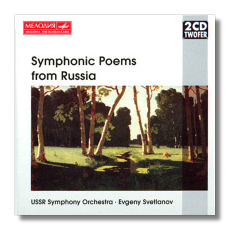
Symphonic Poems from Russia
- Sergei Rachmaninoff:
- The Isle of the Dead, Op. 29
- Prince Rostislav
- Capriccio on Gypsy Themes, Op. 12
- Scherzo for Orchestra in D
- Sergei Mikhailovich Lyapunov: Zelazowa Wola, Op. 37
- Mili Balakirev:
- In Bohemia
- Tamara
- Russia
- Alexander Glazunov:
- Stenka Razin, Op. 13
- Ballad in F Major, Op. 78
USSR Symphony Orchestra/Evgeny Svetlanov
BMG/Melodiya 74321 34166 2 2CDs 75:58 75:09

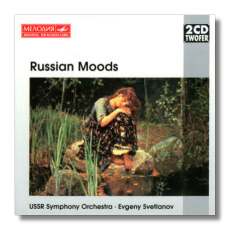
Russian Moods
- Eduard Frantsovitch Napravnik:
- Melancholy, Op. 48
- Night Intermezzo (from Dubrovsky)
- Modest Mussorgsky:
- Dawn on the Moscow River &
- Dance of The Persian Maidens (from Khovanshchina)
- Alexander Glazunov: Lyrical Poem in D Flat Major, Op. 12
- Alexander Borodin: Petite Suite (Orch. Glazunov)
- Nicolai Rimsky-Korsakoff: At the Tomb, Op. 61
- Anton Arensky: Intermezzo in G minor, Op. 13
- Sergei Rachmaninoff:
- Vocalise, Op. 34, #14 (Orch. V. Kin)
- The Rock, Op. 7
- Anatol Liadov:
- Eight Russian Folk Songs for Orchestra, Op. 58
- Musical Snuff-Box, Op. 32
- Vasily Sergeyevich Kalinnikov: Serenade in G minor for String Orchestra
- Mili Balakirev: Suite in D minor on Four Pieces by Frédéric François Chopin
USSR Symphony Orchestra/Evgeny Svetlanov
BMG/Melodiya 74321 34167 2 2CDs 76:15 73:42

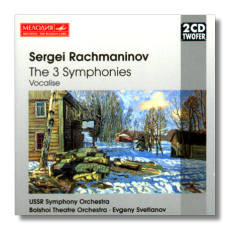
Sergei Rachmaninoff
- Symphonies:
- #1 in D minor, Op. 13
- #2 in E minor, Op. 27
- #3 in A minor, Op. 44
- Vocalise, Op. 34, #14 (Orch. V. Kin)
USSR Symphony Orchestra/Evgeny Svetlanov
BMG/Melodiya 74321 40064 2 2CDs 74:50 77:35

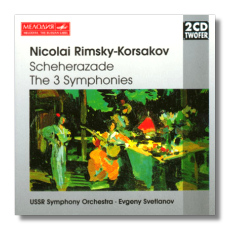
Nicolai Rimsky-Korsakoff
- Symphonies:
- #1 in E minor, Op. 1
- Antar (originally Symphony #2), Op. 9
- #3 in C Major, Op. 32
- Schéhérazade, Op. 35
Heinrich Friedheim, violin (Op. 35)
USSR Symphony Orchestra/Evgeny Svetlanov
BMG/Melodiya 74321 40065 2 2CDs 76:18 74:41

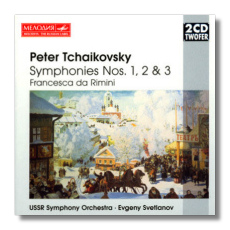
Piotr Ilyitch Tchaikovsky
- Symphonies:
- #1in G minor, Op. 13 (Winter Dreams)
- #2 in C minor, Op. 17 (Little Russian)
- #3 in D Major, Op. 29 (Polish)
- Francesca da Rimini, Op. 32
USSR Symphony Orchestra/Evgeny Svetlanov
BMG/Melodiya 74321 34163 2 2CDs 76:59 69:13
No one can say you don't get your money's worth in any of these six double-CD sets: only one of the twelve discs contains less than seventy minutes of music, and at 69:13 it can hardly be dismissed as a miserly offering. In addition, the sound in these productions, dating from 1962 to 1990, is generally quite decent (with exceptions noted below), even in the earlier efforts. Many Soviet recordings from the 1960's featured glassy-sounding strings, inconsistent orchestral balances, and blaring brass that wouldn't have seemed out of place at a high school football game half-time. BMG's remastering can probably take some of the credit for the sonic successes here, but one cannot overlook the generally creditable efforts of the Soviet engineers who worked with Svetlanov, engineers a cut or two above those servicing Gennady Rozhdestvensky in his Prokofieff series, for instance. Most importantly, though, it's the performances here that make these sets attractive.
I have always liked Svetlanov's work and have flatly dismissed the characterization by his detractors that he was a mere "time beater" on the podium. He knows how to shape the score, obtaining a correct balance between the main line and inner voices, and convincingly pointing up the emotional thrust, whether it be sadness or savagery, grimness or grandeur, passion or playfulness. And typically, as here, he captures the music within its flavorful idiomatic guise. He may draw out raw sound at times, eschewing finesse and subtlety, but he generally makes an excellent case for his approach. Moreover, in the three sets of collections, for instance, there is such an expressive range in the works contained on them that few conductors, even those from Russia, could tackle them with this kind of success.
Some of the textual decisions are out of fashion now: Svetlanov makes the once common cut in the finale of the Rachmaninoff Second Symphony, and he uses Rimsky-Korsakov's rather too civil orchestration of Mussorgsky's Night on Bald Mountain. And, as you may have observed from the headnotes, there are a few duplications on some of the sets: the Rachmaninoff transcription appears on the Rachmaninoff symphony set and on Russian Moods; the Mussorgsky Dawn on the Moscow River shows up on Russian Moods and on Orchestral Pictures from Russia, but in different performances, the former from 1963, the latter from 1974. Both readings are effective.
In general, the numerous items appearing in the three collections are interesting, a good many masterful, in fact. I'm not enthralled with Glazunov's music, I'll confess, and Liadov's just doesn't leave a memorable impression. Kalinnikov, Arensky, Napravnik, and Balakirev are supposedly lesser composers, but the music representing them here belies that status. Svetlanov shortchanges no significant aspect in virtually all readings: he's alert to Borodin's vivid colors and exoticism; he points up the rawer textures of Mussorgsky; and he captures the detached melancholy of Napravnik.
Svetlanov's Rachmaninoff is a mixed bag. Frankly, I don't care for his rather rough-and-ready First, though his finale is penetrating and appropriately savage. I'll take the Ashkenazy/Amsterdam Concertgebouw performance on London any day. Svetlanov's Second, a reading I've known from my LP collection for many years, is brooding and dark, brilliant and colorful, and full of passion. I like his slightly brisk tempo in the first movement, a long movement where other conductors often linger, as though Rachmaninoff were Bruckner. I could easily live with this performance, cut finale and all, but there have been many fine Seconds to choose from: Slatkin, Maazel, DeWaart, Pletnev, etc. The same is true with the Third: Svetlanov is strongly competitive in his fight for elbow room in a crowded field. Sonics, therefore, may become the deciding factor. And while Svetlanov's are decent enough for their time (1962-66), his fall short of most recent efforts. Interpretively, though, he scores a respectable two out of three in this set.
In the Tchaikovsky Symphonies here Svetlanov doesn't employ the heart-on-sleeve approach one usually associates with this composer. Rather, he takes an objective view of these early works, somewhat akin to Lorin Maazel's way with this music. Tchaikovsky has rarely sounded so robust, so unsentimental, so compelling; but, on the debit side, his bombast and garish orchestration haven't been the least reined in, which, I'll admit, might actually be a positive factor, to many listeners. I don't believe I've heard a better Tchaikovsky Second than the one offered here. I had forgotten how good it was: this reading, along with those of the other two symphonies, has been in my LP collection for many years. All three symphonies, in fact, are intelligently interpreted and splendidly performed. The conductor effectively captures the composer's Russianness, his twisted melancholy, his earthy joyousness, and his ostentatious celebrations. Svetlanov re-recorded the entire canon of Tchaikovsky symphonies earlier in this decade, and those performances are available on Canyon Classics. I have not heard them, but suspect they are at least on the same artistic level as these. Further, while the sound in these late 1960's efforts is fairly decent, especially by Soviet standards of the day, it's far from impressive: the strings have an antiseptic sheen to them and brass come across a bit on the bright side. The Francesca da Rimini reading, which shares a disc with the Third Symphony, is utterly compelling and vivid in depicting the score's menace and love, its frustrations and tragedy. To me, this is one of Tchaikovsky's greatest purely orchestral works, apart from the symphonies.
Going from the Tchaikovsky symphonies to the three by Rimsky-Korsakov is akin to taking more than a step or two backward. Not that there's little to enjoy here: the works are skillfully orchestrated and thematically appealing. Yet, Rimsky's sense of drama seems mired in the descriptive and programmatic and veers away from making any sort of truly innovative statement within the symphonic form. And, too, none of the three compositions is quite as thematically distinctive and attractive as his better known non-symphonic works, like Schéhérazade. Still, I have a fondness for the counterpoint-laden Third, and Antar is certainly not without appeal. Svetlanov and his players make an excellent case for this seldom-played music. The bottom line is, if Rimsky's less-traveled highways appeal to you, this very Russian and muscular take on the music won't let you down. As for Schéhérazade (by the way, I use the common spelling, not the one on the cover of this issue, which eliminates the "c"), Svetlanov's is competitive with most of the better ones. Still, to me, no recording quite compares with the classic Reiner/CSO effort from the late 1950's on RCA. Among more recent accounts, some listeners may prefer the suaveness of the Previn/Vienna performance. Actually, in this work there have been so many fine recordings (Beecham, Maazel, Mehta, etc.), that it's hard to recommend just a few. This one by Svetlanov is quite effective in its rugged, less subtle approach, but the 1969 sonics, though adequate, are a bit boxy and bright.
In sum, these six sets represent a good sampling of the fairly consistent art of one this century's more important conductors. Funny, but when Svetlanov does Mahler (as he is currently for Russian Season) the music world pays him more attention. In mixed fare like this, he is often viewed as a specialist, and a man on the fringes of star status. Undeniably, he is a specialist in this kind of repertory, but the expressive range in the many scores here is so broad, it's no wonder that his readings of music out of this sphere are so finely wrought and of such individual character. After Kondrashin and Rozhdestvensky, he is the most important conductor to have emerged from the mid-twentieth century Soviet world.
Copyright © 1998, Robert Cummings


















